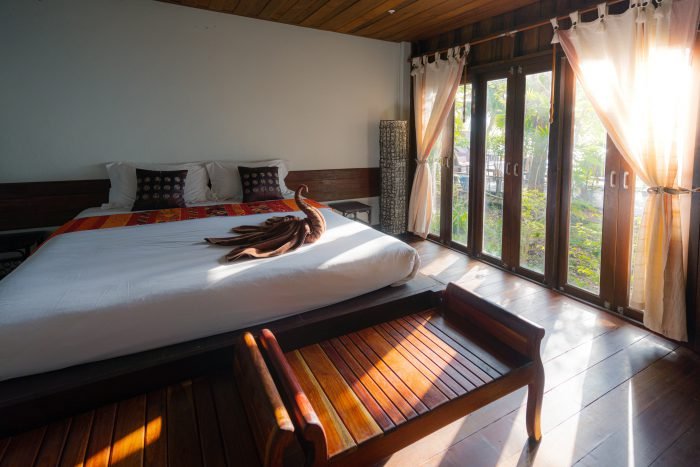Of course, you prefer to be high up in the organic rankings of Google. It costs you nothing per click. The costs are mainly in time and energy to build good rankings. But with your organic rankings alone, you often fail to reach all your potential customers. You can hardly escape advertising on Google as well. Google currently offers two advertising options in the travel industry:
- Advertising via text ads in Google Ads
These ads are quick to set up, and you can turn them on and off whenever you want. You specify the keywords that will identify you. You then provide your ad text, and you indicate through a bid what you are willing to pay per click on your ad. - Via Google’s metasearch
The most well-known at the moment are the Hotel Ads, where Google shows an overview of accommodation providers with prices and availability. The name is somewhat confusing because Google does not only provide this for hotels, but also for other types of accommodation and even for plane tickets and car rentals.
The costs of the advertising options mentioned above can quickly increase. Our experience shows that travel providers spend large parts of the marketing budgets on Google Ads.
So it’s not surprising that many of these providers are constantly looking for ways to control costs and improve returns.
Three ways to increase your profitability
Do you want to get a better grip on the costs for Google Ads and improve the return on investment? Then we advise you to start with the tips below.
- Make your ads more relevant
- Improve your bidding strategy
- Save time in managing your campaigns
Make your ads more relevant
On Google, you search by entering keywords. The trick here is to make sure that your ad will pop up in searches that match your travel offer. Below we give you some tips to increase the relevance of your ads. Some of these tips are clear for experienced advertisers, and other tips are more advanced options.
1. Connect to the correct search terms
Make sure Google shows your ad only in search terms that match your offer. Do you offer specific accommodations in Greece? If so, a search by someone looking for the specific name of your accommodation is very relevant. If someone is looking for ‘vacation in Greece’ then that search is already less relevant. If someone is looking for ‘Hotel Greece’ and you only offer holiday homes, the search query is less relevant. So it is important to advertise with the right keywords, but also to exclude less relevant keywords. These, less relevant, search terms can otherwise lead to unnecessarily high costs.
2. Focus on your ad texts
With text ads, you can write your own text and submit this as the ad text. Classic rules for good ad texts are to include search terms in your ad text and for example, a ‘call to action’. The purpose of a call to action is to really encourage readers to book on your site. Naming your USP’s can also contribute to the success of your ad texts.
Good relevant ad texts lead to higher click-through ratios on your ads (CTR). This has two advantages. On the one hand, a higher CTR brings more visitors to your site. On the other hand, Google rewards high CTR’s with a lower price per click (CPC). Therefore, making ad texts very specific is a rewarding strategy. Searches can vary endlessly. The more you respond to these variations, the higher your CTR and the lower your relative costs.
3. Think of the extensions
Over time, Google has developed more and more supplements to ads. This means that you often see extra information in addition to the text. These are for example Highlight extensions, Site links and Price extensions.
The Highlight extensions are ideal to name the USP of you as a provider, or of the accommodation or destination people are looking for. With site links you can refer to other pages within your site. When people search for a destination, for example, you can link directly to the most popular accommodations in that area. With price extensions you can give price examples. Again, the more relevant the better. Readers will then be triggered more quickly to click.
4. Write killer USPs at Hotel Ads
Advertising texts and extensions play a role in the Search Ads. At Hotel Ads there is less space. There you can put a short USP with the accommodation. However, people often forget this. So make sure you make use of it. Check in advance which USP’s competitors already use and how you can differentiate yourself.
5. Use Room Bundels
Another way to stand out and show more relevant results in Hotel Ads are Room Bundles. Without room bundles, they will only show the ‘from price’ for the cheapest room or house. With room bundles, you can show your complete offer, including all prices. This increases the chance that the traveller will find what he or she is looking for.
Improve your bidding strategy
How much are you willing to pay for a click on Google? That’s always an important question. To determine this, we often start with clarifying what the cost per booking may be. This can, for example, be a percentage of the booking value or an amount per booking.
Previously, you had to, manually, keep track of the bids yourself. So it was a matter of building up data to find out how much one booking would cost you. After that, you could adjust your bids accordingly. The more visitors from Google that book with you (conversion ratio), the more you can bid, the higher your rank on Google and the more bookings you can get.
Nowadays you don’t have to keep track of all those bids manually anymore. You can assign Google, or other bid managers, to set the CPC’s in such a way that the average costs eventually reach an x percentage of the turnover.
These bidding systems usually focus on information from the past. During the booking season, your accommodations will be quickly fully booked, so your conversion rate is high. An automated bid manager takes advantage of this situation and further increases your bids.
So what bid managers often do not take into account is the availability of your travel offer. If you have received a lot of bookings, you will have less accommodation available. The chance that you realize even more bookings then decreases.
If you have your Booking-Arrival-Window well in view, you can respond to trends in availability. Based on your historical data, you can see who is making a reservation at what time for which period. If you also calculate availability for that period, you can calculate the odds of someone booking. Based on this, you can then adjust your bids.
In practice, we see that campaigns still often cost a lot of money, while the occupancy rate for the high season is already very high. A waste of money.
Within Google Hotel Ads, you can also set up a bid where you pay in the form of a commission on the booking amount. This solves the problem of occupancy, you would say. After all, you don’t pay for unnecessary clicks, but only if it results in a booking.
However, there is a downside here as well. Why pay a high commission for the last room you have available in high season if you can get this room booked with ease in another way. For that period you might not want to pay anything at all, or you might want to pay a much lower commission. The challenge is often in the low season, where you’ll probably be willing to pay more for a booking.
In short, if you have a good insight into the seasonal movements in the travel industry and the specific trends therein for you as a travel provider, you can save a lot of money and realize extra bookings.
The next question is, do you want to track and execute all this manually?
Automation
Maintaining campaigns can be simple and doesn’t take much time. Enter some keywords, come up with an ad text, set your bids, and you’re ready to go.
But as we have shown before, it is more complicated if you want to optimize a campaign even more. That takes time. And time also costs money, especially if you have to hire someone to manage it. Nowadays, the automation of these kinds of processes is very possible. Machine learning techniques also contribute to the optimization of bids. By automating, you save on the management costs of your campaigns.
How automation can help you:
- Do you have a lot to offer? Then with the help of an accommodation feed, you can automatically convert your travel offer into highly relevant ads. The automation tool takes care of specific ads, site links and price extensions for each accommodation or destination. If you add destinations or accommodations to your offer or if they disappear, the changes will be implemented immediately
- Automation and data science applications can help ‘split’ keywords from existing ads. The system recognizes which keywords are interesting to split. By splitting off, you can use the ad text can to respond more specifically to the traveller’s search query. This leads to higher click-through rates, a higher market share and lower costs per booking.
- The execution of bids and the mapping of Booking-Arrival-Windows can also be automated. The bidding algorithm responds to historical and recent trends and can calculate what the odds are to get a booking in a certain period.
The weather can also affect the performance of your ads. And this can also be taken into account by an algorithm. The optimization can go so far that bids within Google, for Search Ads and Hotel Ads, are matched. Or bookings coming in via other channels are taken into account. The implementation and tracking of the bids can then also be automated.



